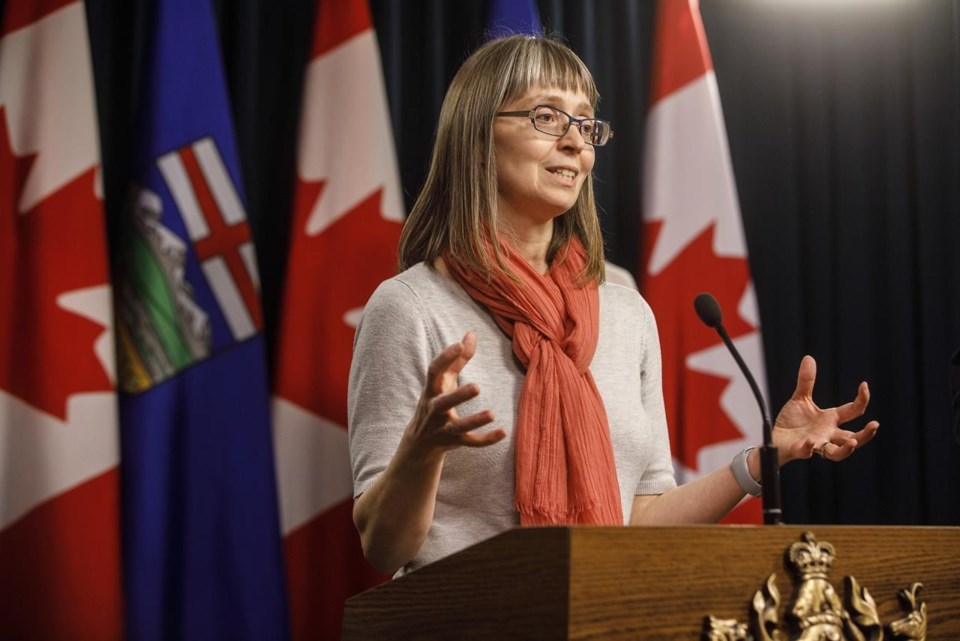EDMONTON — Alberta’s chief medical officer of health says the province is considering a short, but sharp economic lockdown that would act as a “circuit breaker” to help reverse a recent spike in COVID-19 cases.
But Dr. Deena Hinshaw also says every decision needs to weigh larger issues of mental health, well-being and community impact.
“There’s no easy path through this,” Hinshaw told reporters Monday.
“We know that whatever measures we put in place, mandatory or voluntary, they are only going to be effective if Albertans come along with us and follow.”
COVID-19 cases have risen sharply in recent weeks in Alberta including 644 new ones announced by Hinshaw.
There are 192 people hospitalized due to COVID-19, 39 in intensive care. There have been 370 deaths.
In the last five days alone, there have been 3,700 new cases.
The surge is having a deleterious domino effect on health resources and staff: 30 per cent of non-essential surgeries in Edmonton have been cancelled for the foreseeable future.
To that end, 174 Alberta physicians, including emergency room doctors and infectious disease specialists, wrote a public letter Monday to Hinshaw and Premier Jason Kenney saying more needs to be done immediately to prevent hospitals from being overwhelmed caring for both COVID cases and other patients.
“If the rate of COVID-19 spread continues, the consequences to the people of Alberta will be catastrophic,” wrote the doctors.
“The province should consider a two-week, short, sharp lockdown, or ‘circuit breaker’ to drop the effective reproductive number and allow contact tracing to catch up.”
The province has 800 contact tracers and is working to hire 380 more. Last week, Alberta Health Services announced due to spike in cases they have had to reduce the scope of contact tracing.
The province has taken measured steps in recent days to try to control the virus while avoiding the widespread economic lockdowns imposed, and later lifted, earlier this year such as closing bars, restaurants and retailers.
Kenney has resisted calls to take drastic steps, saying the data isn’t there to support it and that a sweeping curtailment of public interaction could be far more harmful.
“Our data indicates it’s currently safer to eat out at a restaurant at a table with no more than six with protections in place than to attend a private gathering at someone’s home,” Kenney said Friday.
“Currently about 40 per cent of active cases in the two big cities are linked to household transmission or a private event.”
The province is asking families in Edmonton and Calgary to stop hosting extended gatherings and get-togethers. Public social gatherings in those two cities and surrounding areas are limited to 15 people. This includes functions like banquets and wedding receptions. The limit does not extend to wedding services.
Opposition NDP health critic David Shepherd said his party doesn't want to see an economic lockdown, but said the government must do more in the meantime to slow the virus, such as signing on to the federal tracing app and creating a risk index to help businesses prepare for changes in health orders.
"If we reach a point where our acute health care system is overrun and the province is compelled into a lockdown, Albertans will look back at October and November and ask if everything that could have been done was done," said Shepherd.
"As of today, sadly, the answer to that question is no."
Also Monday, Health Minister Tyler Shandro said the province is heartened but cautious after U.S.- based pharmaceutical giant Pfizer Inc. announced that its COVID-19 vaccine was 90 per cent effective based on early results.
“I’m optimistic that there will be a vaccine, or several, starting distribution in the next several months, but I emphasize we have to contain the virus until a vaccine is widely distributed — and that’s going to be a number of months," said Shandro.
This report by The Canadian Press was first published Nov. 9, 2020.
The Canadian Press



